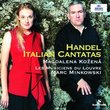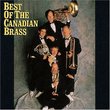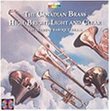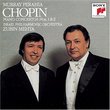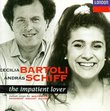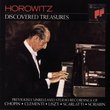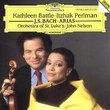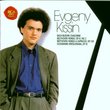| All Artists: Claudio Monteverdi, Andrew Parrott, Taverner Consort Title: Monteverdi: Vespro della Beata Vergine 1610/Venetian Vespers Members Wishing: 0 Total Copies: 0 Label: EMI Classics Release Date: 4/11/2000 Genre: Classical Styles: Opera & Classical Vocal, Historical Periods, Baroque (c.1600-1750) Number of Discs: 2 SwapaCD Credits: 2 UPCs: 724356166226, 724356166257 |
Search - Claudio Monteverdi, Andrew Parrott, Taverner Consort :: Monteverdi: Vespro della Beata Vergine 1610/Venetian Vespers
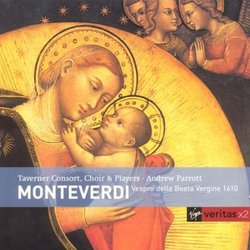 | Claudio Monteverdi, Andrew Parrott, Taverner Consort Monteverdi: Vespro della Beata Vergine 1610/Venetian Vespers Genre: Classical
|
Larger Image |
CD DetailsSimilarly Requested CDs |
CD ReviewsA reasonable bargain(?) Sator | Sydney, Australia | 07/02/2005 (4 out of 5 stars) "Claudio Monteverdi's Vespers of 1610 are increasingly becoming to be seen as a landmark work in the history of Western music. This is one of the most outstanding works of the late Renaissance composers of the Seconda Prattica (Second Pratice) amongst whom Monteverdi - one of the fathers of opera - was arguably the most forward looking. In fact Monteverdi is so forward looking he is often described as being an early Baroque composer. Elements of the work are highly conservative such as the widespread writing in multiple parts - a practice that had already become increasingly unusual by this time (and totally anachronistic by Bach's time), yet the entire work contains a fantastic profusion of colourful music and an instrumental ensemble which is varied to match the mood of each piece. In this regard his music can be compared to the paintings of Titian with its typical Venetian overflow of exuberance and colourfulness, that contrasts markedly with the Northern sobriety of the sacred works of Bach. This a work of unbridled sensuality and yet of luxurious refinement. I have listened to this version of the Monteverdi Vespers for many years and have always somehow been left feeling partially dissatisfied by it despite the lavish praise heaped upon it by many reviewers over the years. Certainly it has it moments of greatness, yet I wish the reading as a whole would cohere more. Although the singers here are all stars, a star studded legion of singers do not an ensemble make. So I have waited years to find a recording that might surplant it. Years went by and recordings came and went without anything really grabbing my attention. Then recently I discovered a recording that seems to have eluded me: Masaaki Suzuki with the Bach Collegium Japan on the Swedish boutique label Bis (ASIN B00005K2BK). Of course the virtues of their Bach are well known and many a reviewer has written their story of at first ridiculing the thought of a Japanese period instrument group to then being completely floored by their performances again and again. Suzuki seems to have everything I have every felt was missing in the Parrott, even if here and there Parrott has some altenative insights (the Nisi Dominus is an example where Suzuki seems dangerously over-exuberant!), these moments are rare exceptions. Suzuki fully captures that uninhibited Venetian exuberance of the writing bringing the whole together as a whole rather than just having sporadic moments. Still, the lush modal harmonies seem just that much more succulent and the resultant expressive impact is incomparable. For someone who has tolerated the Parrott for almost ten years the weight of burden being lifted was just huge! For the price I guess if you need a budget version, then the Parrott is now competitive especially if you prefer your Monteverdi sung one to a part. However, the BIS recording for Suzuki is, as usual from them, just stunning. In the BIS recording there is far greater spaciousness and air around the instruments and voices, with timbre coming through in all its riches without being bleached. The BIS recoridng is fair audiophile quality (it is BIS policy to avoid compression devices or blatant post-production processing), that renders it first choice to anyone for whom recorded sound quality dictates preferences. The EMI recording for Parrott sounds like early 16-bit digital sound at its thinnest and boxiest - a fact exacerbated by the glassiness that comes with Virgin sound transfers (Virgin desperately need to review their remastering and digital transfer equipment/methods). You certainly get what you pay for. So take your pick - the cheap and easy option of Parrott or the rich fullness of Suzuki's Dionysian exuberance. Also there is always Rinaldo Alessandrino version for those insistent on hearing this sung one to a part - the sound there is even better than on the BIS." Easily the best recording of the Vespers Frederick II of Hohenstaufen | right here | 03/13/2004 (5 out of 5 stars) "Andrew Parrott's recording is rightly considered by critics and listeners alike as THE recording of Monteverdi's Vespers of 1610. Using minimal forces, the individual voices layering upon one another can be clearly heard, not drowned out into a mass of sound as in many "fuller" recordings. The only other "five-star" recording of the Vespers is the Konrad Junghanel with Cantus Colln. If I could only own one recording of this work, the Andrew Parrott would me the one." Let's Compare and Share! Giordano Bruno | Wherever I am, I am. | 09/24/2008 (5 out of 5 stars) "Claudio Monteverdi's Vespro della Beata Vergine of 1610 is a monument that straddles the transition from the musical values of the late renaissance and the early baroque like the Colossus of Rhodes, incorporating hugely different elements, from antiphonal chant to prima prattica tenor-structured polyphony to secunda prattica accompanied recitativo and operatic aria, yet achieving the kind of unity represented by holding its listeners spellbound. It is, like the Colossus, one of the Seven Wonders of musical history. It's also one of the most frequently performed works of sacred music in the world, ranking only behind Handel's Messiah and bach's B-minor Mass. Accordingly, there have been dozens of recordings of it, and many of them have been quite fine. To 'carry off' the Vespers, one needs above all two virtuosic cornetto-players, three tenor singers of great vocal agility whose voices match closely, and an acoustic that flatters a well-disciplined chorus capable of the restraint needed for polychoral polyphony. Yes yes, everything else needs to be nearly perfect also. Thus there can never be an absolutely ultimate recording of the Vespers; sections of one will always be better than sections of another.
This performance by conductor Andrew Parrott has long been taken as the standard of overall excellence. It is still the best-selling of all recordings of the Vespers, by a wide margin. And it's very good! I've listened to it with pleasure on three continents. But I'm interested in comparing it with other recordings - most of them more recent. You will soon see that almost every major conductor feels a need to perform the Vespers his way: Nicholas Harnoncourt, with Concentus Musicus Wien John Eliot Gardiner, with the Monteverdi Choir and Orchestra Konrad Junghaenel, with Cantus Coelln Jordi Savall, with La Capella Reial Philippe Herreweghe, with La Chapelle Royale Rene Jacobs, with Concerto Vocale Rinaldo Alessandrini, with Concerto Italiano Stephen Stubbs, with Tragicomedia and Concerto Palatino Maasaki Suzuki, with Bach Collegium Japan Frieder Bernius, with Musica Fiata There are others, but these are the ones I'm familiar with. All of them are excellent in one way or another, IMHO. What I'd like to do is to invite readers who are thrilled or displeased with any performance of the Vespers - those listed or others - to comment on this review, to say specifically what you admire or dislike about the performances. The result will be, I hope, a kind of round-robin evaluation of the current state of performance and recording. Please don't get off-topic, and please avoid denunciations." |

 Track Listings (22) - Disc #1
Track Listings (22) - Disc #1